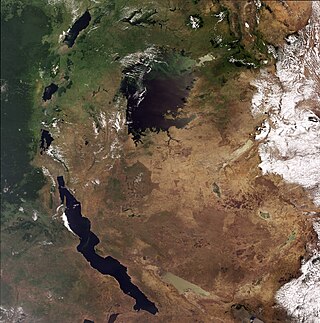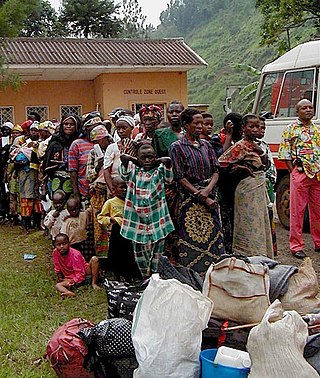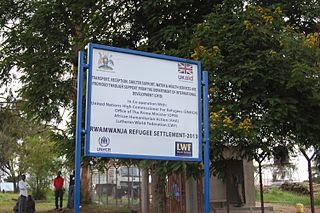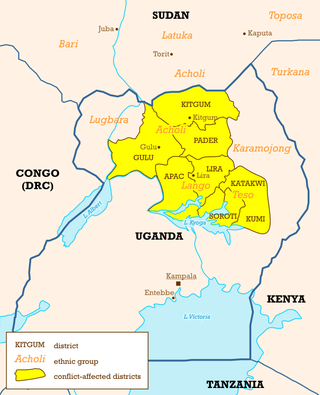
Paul Kagame is a Rwandan politician and former military officer who has been the fourth President of Rwanda since 2000. He was previously a commander of the Rwandan Patriotic Front (RPF), a rebel armed force which invaded Rwanda in 1990. The RPF was one of the parties of the conflict during the Rwandan Civil War and the armed force which ended the Rwandan genocide. He was considered Rwanda's de facto leader when he was Vice President and Minister of Defence under President Pasteur Bizimungu from 1994 to 2000 after which the vice-presidential post was abolished.

A refugee camp is a temporary settlement built to receive refugees and people in refugee-like situations. Refugee camps usually accommodate displaced people who have fled their home country, but camps are also made for internally displaced people. Usually, refugees seek asylum after they have escaped war in their home countries, but some camps also house environmental and economic migrants. Camps with over a hundred thousand people are common, but as of 2012, the average-sized camp housed around 11,400. They are usually built and run by a government, the United Nations, international organizations, or non-governmental organization. Unofficial refugee camps, such as Idomeni in Greece or the Calais jungle in France, are where refugees are largely left without the support of governments or international organizations.

North Kivu is a province bordering Lake Kivu in the eastern Democratic Republic of the Congo. Its capital is Goma.

The African Great Lakes are a series of lakes constituting the part of the Rift Valley lakes in and around the East African Rift. The series includes Lake Victoria, the third-largest fresh water lake in the world by area; Lake Tanganyika, the world's second-largest freshwater lake by volume and depth; Lake Malawi, the world's eighth-largest fresh water lake by area; and Lake Turkana, the world's largest permanent desert lake and the world's largest alkaline lake. Collectively, they contain 31,000 km3 (7,400 cu mi) of water, which is more than either Lake Baikal or the North American Great Lakes. This total constitutes about 25% of the planet's unfrozen surface fresh water. The large rift lakes of Africa are the ancient home of great biodiversity, and 10% of the world's fish species live in this region.

The Second Congo War, also known as the Great War of Africa or the Great African War, began in the Democratic Republic of the Congo in August 1998, little more than a year after the First Congo War, and involved some of the same issues. Eventually involving belligerents from across the African continent, the war officially ended in July 2003 when the Transitional Government of the Democratic Republic of the Congo took power. Although a peace agreement was signed in 2002, violence has continued in many regions of the country, especially in the east. Hostilities have continued since in the ongoing Lord's Resistance Army insurgency, and the Kivu and Ituri conflicts. Nine African countries and around twenty-five armed groups became involved in the war.

The Great Lakes refugee crisis is the common name for the situation beginning with the exodus in April 1994 of over two million Rwandans to neighboring countries of the Great Lakes region of Africa in the aftermath of the Rwandan genocide. Many of the refugees were Hutu fleeing the predominantly Tutsi Rwandan Patriotic Front (RPF), which had gained control of the country at the end of the genocide. However, the humanitarian relief effort was vastly compromised by the presence among the refugees of many of the Interahamwe and government officials who carried out the genocide, who used the refugee camps as bases to launch attacks against the new government led by Paul Kagame. The camps in Zaire became particularly politicized and militarized. The knowledge that humanitarian aid was being diverted to further the aims of the genocidaires led many humanitarian organizations to withdraw their assistance. The conflict escalated until the start of the First Congo War in 1996, when RPF-supported rebels invaded Zaire and sought to repatriate the refugees.

The New Humanitarian is an independent, non-profit news agency focusing on humanitarian stories in regions that are often forgotten, under-reported, misunderstood or ignored.
Fondation Chirezi (FOCHI) is a local non-governmental organisation established in the African Great Lakes Region by Floribert Kazingufu Kasirusiru. The core objective of FOCHI is to build a campaign for a non-killing society in the Great Lakes Region - eastern parts of the Democratic Republic of the Congo (DRC) which has suffered both the Second Congo War and terrible waves of genocide in both Rwanda and Burundi.
"Since the early 1990s the African Great Lakes region – defined here as the Democratic Republic of Congo (DRC), Burundi, Rwanda, Uganda and Tanzania – has been convulsed by genocide, civil wars, inter-state conflict and flawed democratic transitions. With UN-sponsored peace processes underway in DRC and Burundi and projects of state and societal reconstruction apparently advancing in Rwanda and Uganda, there are hopes that the epoch of violence and exploitation in the African Great Lakes region is finally drawing to an end."

The Kivu conflict is an umbrella term for a series of protracted armed conflicts in the North Kivu and South Kivu provinces in the eastern Democratic Republic of the Congo which have occurred since the end of the Second Congo War. Including neighboring Ituri province, there are more than 120 different armed groups active in the eastern Democratic Republic of Congo. Currently, some of the most active rebel groups include the Allied Democratic Forces, the Cooperative for the Development of the Congo, the March 23 Movement, and many local Mai Mai militias. In addition to rebel groups and the governmental FARDC troops, a number of national and international organizations have intervened militarily in the conflict, including the United Nations force known as MONUSCO, and an East African Community regional force.

The Democratic Republic of the Congo, and the east of the country in particular, has been described as the "Rape Capital of the World", and the prevalence and intensity of all forms of sexual violence has been described as the worst in the world. Human Rights Watch defines sexual violence as "an act of a sexual nature by force, or by threat of force or coercion", and rape as "a form of sexual violence during which the body of a person is invaded, resulting in penetration, however slight, of any part of the body of the victim, with a sexual organ, or of the anal or genital opening of the victim with any object or other part of the body."
Ishasha border point is a border crossing station and customs post in the Kanungu District in the Western Region of Uganda. It is inset approximately 350 metres (1,150 ft) from the Ishasha River, which is the Uganda-Democratic Republic of the Congo (DRC) border locally, and is 1.3 kilometres (0.81 mi) from the town of Ishasha, Democratic Republic of the Congo, across the river in the DRC.
Africa Humanitarian Action (AHA) is a non-governmental organization that provides relief services to countries in Africa. It was founded by Dr. David Zawde in 1994 in response to the Rwandan genocide.
Kiryandongo Refugee Settlement is a refugee camp in Bweyale in Kiryandongo district Uganda.

Rwamwanja Refugee Settlement is a refugee camp in Kamwenge District in southwestern Uganda and is home to nearly 70,000 refugees.

Nakivale refugee settlement is a settlement located in Isingiro District near the Tanzania border in Southwest Uganda.
Kyaka II Refugee Settlement is a refugee camp in Kyegegwa District in western Uganda.
Nkusi Hydroelectric Power Station, also referred to as Nkusi Power Station, is a 9.6 MW (12,900 hp) hydroelectric power station in the Western Region of Uganda.

Uganda is one of the largest refugee-hosting nations in the world, with 1,529,904 refugees. The vast influx of refugees is due to several factors in Uganda's neighboring countries, especially war and violence in South Sudan and the Democratic Republic of the Congo, and associated economic crisis and political instability in the region. Uganda has relatively 'friendly' policies that provide rights to the refugees, such as rights to education, work, private property, healthcare and other basic social services.
Oruchinga Refugee Settlement is a refugee camp in Isingiro District in Southern Uganda.

COBURWAS International Youth Organization to Transform Africa, commonly known as CIYOTA is a Ugandan not-for-profit refugee-education organisation. It was formed in 2005 by refugee youth and was the Africa finalists for the Nansen Refugee Award in 2013.













